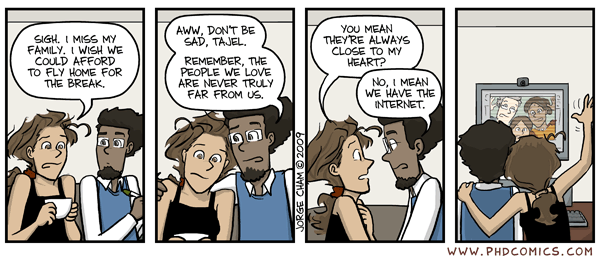Today I had a long conversation with my host mom about safety and related issues. I'd gone over for Friday lunch, a near-weekly tradition.
I got there around noon, in time for the requisite playing with the baby, talking about the king's visit, and comparisons between this winter and last winter. (Summary: little Mbarak still looks like a mini-mafioso, but he smiles all the time and might be teething already; the king gave buckets of money and supplies to Berberville and its citizens, but everybody is of a different mind as to just how he should have distributed the wealth; this year is mild beyond belief - no snow yet! it even sprinkled *rain* today!)
After the food got cleared away, and all the men and children (except tiny Mbarak) cleared out, Ama and I sat down for some woman-to-woman talk.
She knows I've been traveling a lot lately, and knows that it's not my favorite thing. We talked about all the unwanted attention I get when I travel alone, and she said some harsh things about the men of her country. ("All men are bad." "You can't trust any of them.") When I protested - there are respectful, kind men in Morocco - she said, "OK, but for every one good man, there are a thousand bad ones. A THOUSAND."
There's also been a story in the news lately about the sexual assault of a Peace Corps Volunteer. Ama didn't have details of that one, but she told me a story about a PCV stationed here in Berberville a few years ago. This girl had been traveling to Rabat, along a route I often use, and had found herself stuck in one of the towns along the way (as happens not-infrequently, given the unreliability of transportation around here). She'd been chatting with a guy in the taxi, and he invited her back to his place. He assured her that he had a wife and kids at home, that they would make her welcome, etc. So she goes with him, and as soon as he opens the door, she can see it's a bachelor pad. (As Ama said: "She knew this was not the house of a woman. It was dirty.") He takes her arm, sits her down in the main room, tells her to make herself comfortable, spend the night...and offers to make tea. She eagerly accepts the offer of tea - knowing it takes a few minutes to brew - and asks where to find the bathroom, after her long trip. When he goes into the kitchen to start the tea, she grabs her bag and bolts, fleeing to a local hotel. She was sufficiently shaken up that she wept when she told Ama (her host aunt) about it, several days later.
She had other stories, not featuring PCVs. In one, a neighbor of ours was conducting a private tour for a European woman. Tourism and sex tourism overlap extensively in Morocco, so he might actually have believed that she expected sex, but when she began yelling NO and fighting him off... According to Ama, the mule-driver busted into the tent and beat the living snot out of the guide, interspersing his blows with reminders that good Muslims don't rape women.
At this point, she basically went through a run-down of all the men I've ever talked to in town (all in public, in broad daylight - she taught me well), denouncing some as just bad, and describing others as OK if their wives are around. In general, she said, just don't go with a man who invites you for tea. If you know he's married, and if his wife is home...OK. (For this short list of the OK men.) But for all the rest, just say no.
She reiterated the guidelines she's told me a dozen times before:
(1) Never open the door to a man after dark. Go up on the roof and look down. There's a street lamp across from the house, so you'll be able to see him. If it looks like trouble, call either my uncle (the moqaddim, who lives next door) or the gendarmes. If it looks harmless, tell him to come back tomorrow, during the day. If he won't go away, call the gendarmes.
(2) Don't go to men's homes to have tea. If it's a married man and I'm friends with his wife, it's OK if she's home. If I get to the door and she doesn't greet us, just go.
(3) Don't trust [this one guy]. Or [this other guy]. Or [that man]. Or [that other man].
(4) If I'm ever scared, I should just go to their house and spend the night. Or just move back in. Really, I should move back in. The months are going to fly by until May... My room is still sitting there, waiting for me... Any time I want, I can come to sleep for the night. Or for the week. Or the month. Or the next six months.
I've heard these before, except that (3) was new as of this conversation; she's never before gone through a one-by-one list of all the men I know. Most of the ones she warned me against I'd already gotten a bad vibe off of - there are reasons I only talk to men during the day, in public places - but a few surprised (and disheartened) me.
Lhumdullah, we both agreed that Baba is one of the good ones. "Even if I'm not here, if the kids aren't here, you're safe being here with him. He sees you as his own daughter. Even if he didn't, he always respects women. I've lived here in Berberville with him for 15 years, and have never heard a woman say anything against him. Never."
I'd put my sitemate's host dad in the same gold-star-of-trustworthiness category, and Ama agreed that he's a good man, but said, "It was different when he was the father of your friend. Your sister. Then, he was your family, too. But now... Go over if his wife is there. If she's not there, just wait and go back another time." Even good men, she said, just can't be trusted if you're alone with them.
The other side of this coin of distrust is that Moroccan men don't trust women. They fear women as siren temptresses, irresistibly dragging them from lives of virtue. (This is why women should veil, of course; serious scholars have said that it's "proven" that women's hair "emits a ray" that strikes men and forces them to want sex.)
Men fear the sexual power that women wield; women fear the sexual violence that men threaten.
Speaking of hair... I chopped mine off just before coming to Berberville, so Ama met me with hair as short as a male news anchor. Shorter than Secretary of State Clinton's. She begged me not to cut it again, but to let it grow out, and I have. After 18 months without so much as a trim, it's back down to my shoulder blades. And now: She wants me to tie it back in a ponytail. It was OK to leave it down when it was around chin-length, but now... Now it's too seductive. Puts me, her beloved daughter, in too much danger.
As much as I love my village and my host family, some days are ... hard. Some days, I want to agree with Ama that there aren't any good men - certainly not more than one in a thousand. Some days, I want to flail and scream and beat the living snot out of a few, myself. Some days, I want to curl up and cry. Today, I'm doing well. I'm disappointed to know that a few of the men in town who I'd trusted have a history of mistreating women...but I'm not devastated by it. Not today. I've had a bad week - ever since I heard about the assault on the PCV - but today is a good day, lhumdullah. Today, I'm grateful for Ama and Baby Mbarak and my honorable, upstanding Baba. And today, that's enough.










